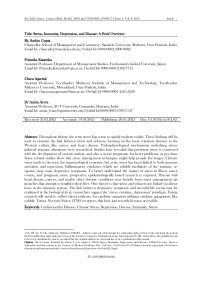Stress, Immunity, Depression, and Disease: A Brief Overview
Автор: Sh.S. Gupta, Priyanka K., Charu A., Dr Amita A.
Журнал: Science, Education and Innovations in the Context of Modern Problems @imcra
Статья в выпуске: 4 vol.8, 2025 года.
Бесплатный доступ
Throughout history, the term stress has come to signify modern reality. These findings will be used to examine the link between stress and sickness, focusing on the most common diseases in the Western culture like cancer and heart disease. Pathophysiological mechanisms underlying stress-induced immune alterations were researched. Studies have revealed that persistent stress is connected with the development of serious anxiety, and also a worse prognostic for heart problems, as per data. Some related studies show that stress management techniques might help people live longer. Chronic stress tends to decrease the immunological response, but acute stress has been linked to both immune activation and repression. Inflammatory cytokines, which are soluble mediators of the immune re-sponse, may cause depressive symptoms. To better understand the impact of stress in illness onset, course, and prognosis, more prospective epidemiologically based research is required. Patients with heart disease, cancer, and maybe other chronic conditions may benefit from stress management ap-proaches that attempt to lengthen their lives. One theory is that stress and sickness are linked via altera-tions in the immune system. The link between depressive symptoms and stressful life events may be explained at the biological level, researchers suggest the "stress, cytokine, depression" paradigm. Future research will need to collect direct evidence for cytokine causation utilizing cytokine antagonists, like soluble Tumor Necrosis Factor (TNF) receptors, that have just recently become accessible.
Cardiovascular Disease, Chronic Stress, Depression, Disease, Immunity, Stress
Короткий адрес: https://sciup.org/16010563
IDR: 16010563 | DOI: 10.56334/sei/8.4.02


